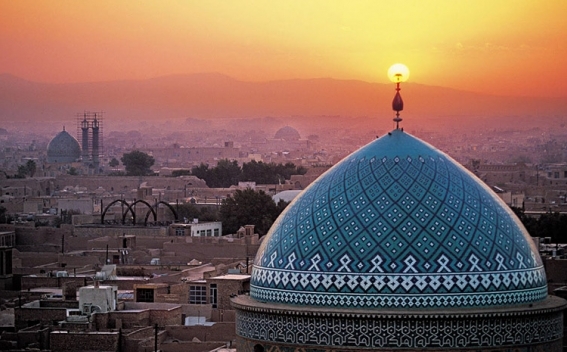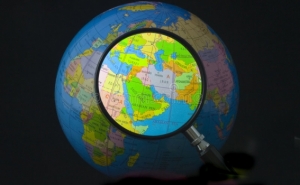Iran's Foreign Policy in 2017

2017 was quite saturated for the foreign policy of Iran. In May 2017, presidential elections were held in Iran, the outcome of which was decisive for the country's foreign policy.
It should be noted that this time the Supreme leader of Iran, Ayatollah Ali Khamenei, was not in favor of seeing Rouhani in this post, as he was attempting to implement an independent policy. As a result, in spite of the forecasts, a hot election race broke out between Rouhani and Ebrahim Raisi, who enjoys the support of Khamenei. The main theme of the campaign was the nuclear deal signed by Rouhani. Although the Iranian society was dissatisfied that the signing of a nuclear transaction largely did not improve the country's economic situation, Rouhani succeeded in being re-elected thanks to the big support of the youth.
However, Rouhani's re-election caused some tension in Iran's internal politics. According to some analysts, Rouhani's brother's - Hossein Fereydun, arest before the inauguration of the president was an attempt to press Rouhani so that he would abandon his own attempt to pursue an independent policy. It is particularly about Rouhani's attempts to regulate relations with the West in particular.
In this regard it should be noted, that though there is no discontent in the UN about the implementation of the nuclear deal with Iran, in 2017 significant progress was recorded in the West-Iran relations. The United States were regularly calling to cancel the deal continuing to impose unilateral sanctions against Iran. The sanctions were mainly related to Iran's nuclear program, as Tehran's progress in this sphere had a very negative reaction in the US. The United States is trying to get a complete ban on Iranian ballistic missiles (Currently, only a nuclear warhead-bearing rocket is forbidden), meanwhile in Tehran they are going to strengthen their ballistic program. All this naturally created a negative background for the development of Iran's relations with European countries. However, it should be noted that this policy of the American administration also caused dissatisfaction among the European partners who have begun to develop economic relations with Iran.
As for Iran's regional policy, it should be noted that in 2017 Iran was quite active in the fight against terrorism in the region. Iran's activation in this direction contributed to the terrorist acts in the Iranian parliament in June, and the Islamic Revolution leader Ayatollah Khamenei's mausoleum, the responsibility of which took the Islamic State terrorist group.
The settlement of the Syrian conflict was also one of Tehran's foreign policy priorities this year and Iran made some progress. Particularly, in collaboration with Russia and Turkey in securing ceasefire in Syria, Iran managed to strengthen and, in some sense, legitimize its presence in Syria (Iran is a guarantor country of ceasefire in Syria).
In 2017, Iran also managed to strengthen relations with neighboring Iraq due to the support rendered to Baghdad in the Kurdish issue. Cooperation in Syria, as well as approaches to the Iraqi referendum on independence, allowed Iran and Turkey to forget about existing disagreements and find ways of cooperation this year, which was particularly successful in the trilateral, Russia-Iran-Turkey format.
The year can also be considered successful for cooperation in the Iran-Russia-Azerbaijan format. During the Rohani-Putin-Aliyev meeting which took place in Tehran at the end of the year, the parties agreed to deepen cooperation in the energy sector, as well as create a customs green corridor between the two countries, which could have a significant impact on the development of economic relations.
At the same time it should be noted that the year was rather strained for Saudi Arabia-Iran, Israel-Iran relations. The confrontation between Iran and Saudi Arabia continued not only in Syria and Yemen, but also in Lebanon, causing political crisis and in Qatar leading to Doha's isolation from a number of Arab countries.
Saudi-Iranian and Israeli-Iranian tensions in 2017 were so sharp that even these hostile countries - Saudi Arabia and Israel - took steps to create an alliance against Iran.
So, in general, it is worth mentioning that 2017 was a rather complicated but at the same time an effective year for Iran.
Other materials on this subject
- Iran denies reports on joint construction of UAV plant with Russia "Arms exporters and instigators of wars seek to justify their unilateral actions and blunders in plotting war by falsifying news," he responded to Mehr's request for comment on the newspaper's report....
- Azerbaijani MFA issues anti-Iranian statement The Ministry noted that about 100 countries and secretariats of several international organizations condemned the armed attack on the Azerbaijani diplomatic mission in Iran, stressing the need to punish...
- Iran condemns sanctions imposed by EU, Britain and threatens retaliation The European Union imposed sanctions on more than 30 Iranian officials and organisations, including units of the powerful Revolutionary Guards, blaming them for a "brutal" crackdown on unrest and other...
- Zohouri: Armenia's security is Iran's security "I hope that this cooperation as two ancient and centuries-old countries will further develop. Work is being carried out in different directions, related to the road, economic cooperation, etc., which...
- Russia, Iran are negotiating creation of common steblecoin on gold The Iranian government intends to secure this token with gold, that is, it will be a kind of steblecoin. The token is expected to work in a special economic zone in Astrakhan, which will receive cargo...
-
 17:08
17:08The regular session of the Anti-corruption Policy Council takes place in Jermuk
-
 15:05
15:05The Prime Minister sends congratulatory messages to the supreme leader of Iran and the President of Iran
-
 11:11
11:11Armenia sends earthquake aid to Turkey
-
 10:43
10:43Commemoration of the Pontiff St. Sahak Partev
-
 09:16
09:16Some roads are closed and difficult to pass in Armenia
-
 19:55
19:55Phone conversation of the Foreign Minister of Armenia with the U.S. Assistant Secretary of State for European and Eurasian Affairs
-
 18:30
18:30Prime Minister Pashinyan and President Khachaturyan meet
-
 18:20
18:20Ararat Mirzoyan with Co-Chairman of the OSCE Minsk Group of France Brice Roquefeuil
-
 17:01
17:01Humans could land on Mars within 10 years, Musk predicts
-
 16:45
16:45France, US urge 'immediate' end to Nagorno Karabakh blockade
-
 16:01
16:01Blockaded Nagorno Karabakh launches fundraiser to support quake-hit Syria
-
 15:59
15:59Earthquake death toll in Turkey rises to 18,342
-
 15:43
15:43Ararat Mirzoyan Held a Telephone Conversation with Sergey Lavrov
-
 15:06
15:06French president rules out fighter jet supplies to Ukraine in near future
-
 14:47
14:475 Day Weather Forecast in Armenia
-
 14:44
14:44President Vahagn Khachaturyan wrote a note in the book of condolences opened in the Embassy of Syria in Armenia
-
 14:20
14:20Azerbaijan’s provocations impede establishment of peace and stability – Armenian FM tells Russian Co-Chair of OSCE MG
-
 12:57
12:57France representation to OSCE: Paris calls on Azerbaijan to restore freedom of movement through Lachin corridor
-
 11:40
11:40Command of Kosovo forces highly appreciated preparation of Armenian peacekeepers
-
 10:16
10:16The United States withdrew from sanctions against Syria for six months the provision of assistance after the earthquake
day
week
month
Humidity: %
Wind: km/h


